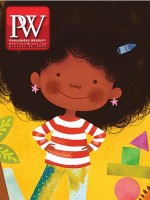These days, essayist Annabelle Gurwitch (You’re Leaving When?, Counterpoint, Apr.) appreciates writing that offers closure. “With the pandemic, everything’s taking so much longer,” she says. “It seems harder to complete tasks, but reading essays and short stories, I get that beginning, middle, and end experience.”
Personal essays in particular can offer a welcome sense of connection with the writer, say other practitioners of the form. “One of the things I miss most about having a social life is meeting a new friend, or reconnecting with an old one,” says Melissa Febos (Girlhood, Bloomsbury, Mar.). “The best essays give me that feeling.”
To Ben Philippe, essays have an advantage for readers feeling depleted. He says he hopes Sure, I’ll Be Your Black Friend (Harper Perennial, May) “provides some of the benefits of a casual friendship with me, and the general shenanigans of life as a Black guy in 2020” without “the emotional exhaustion of maintaining a real face-to-face friendship.”
These and other forthcoming collections present an array of friendly options to choose from.
Black Nerd Problems
Assorted pop culture essays by the creators of the eponymous website address race, the Marvel Cinematic Universe, superhero authoritarianism, and, to take one title, how “Mario Kart Reveals the Inner Villain in All of Us.” Prepub materials say the collection is intended “for an audience unafraid to admit that they love anime, comic books, and all things nerdy.”
more
Broken (in the Best Possible Way)
The writer behind the Bloggess website, who owns Nowhere Bookshop in San Antonio, Tex., tackles tough subjects, such as her decision to undergo experimental treatment for depression, with signature humor. Her previous confessionals, 2012’s Let’s Pretend This Never Happened and 2015’s Furiously Happy have sold a combined 660,000 print copies, per NPD BookScan; of her latest, PW’s review said, “The beauty of these essays lies in Lawson’s unfailing hopefulness amid her trials.”
more

Everybody (Else) Is Perfect
Korn transports readers just a few years back, yet to a different era: 2018 in the New York City magazine world. At age 28, Korn ascended to the position of youngest editor-in-chief of Nylon, becoming the only lesbian to helm a major fashion magazine at that time. Essays detail her coming-of-age, battles with disordered eating, feminism, burnout, and how she reframed the beauty industry’s purpose: not to attract a mate, but for self-care.
Girlhood
In her second essay collection, Febos grapples with female adolescence and everything after. The memorable “Thank You for Taking Care of Yourself,” in which she attends a “cuddle party”—pre-Covid, of course—becomes a vehicle for delving into the concept of emotional labor. “The prose is restrained but lyrical throughout,” PW’s review said. “Raw and unflinching, this dark coming-of-age story impresses at every turn.”
more
Goodbye, Again
Sun (Everyone’s a Aliebn When Ur a Aliebn Too), an illustrator and TV writer with 577K Twitter followers, blends personal essays, poems, and stories, including a tearjerker in the form of egg recipes. Concluding an essay about dim sum, he writes, “You successfully escaped from the ordinary, constant, churning movement of the world, and the return to it is always disorienting, in the same way you come out of a movie theater and are surprised that it is still daytime, or surprised that it is midnight, because while you were in there, days passed, years passed, a whole lifetime passed in front of your eyes.”
more

Hola Papi
Brammer’s book takes its name from his Substack advice column, which was originally pitched as “a queer Latino ‘Dear Abby.’ ” The collection covers coming of age, coming out, authority, and identity, as in this take on Grinder: “It was on this app that, for the first time ever, some white guy greeted me by saying, ‘Hola papi.’ I’d never really considered myself any kind of ‘papi.’ I was a mixed-race Mexican American with noodle arms who couldn’t legally drink yet.”
Spilt Milk
In what PW’s starred review called a “keenly perceptive” debut, Zoffness tackles anxiety, religious ambiguity, a sexual harassment case, and her four-year-old’s obsession with playing cop: “Officer Leo squints, shifts his lower jaw from side to side, mumbles something to headquarters on his faux walkie-talkie. His superiors are surprisingly flexible. I’m sorry, ma’am, he says finally, and unfastens my binds. It wasn’t you. It was someone who looked like you. Which is to say, a woman whom the world sees as white.”
more

Sure, I’ll Be Your Black Friend
The author of two YA novels, including 2020’s PW-starred Charming as a Verb, writes a memoir-in-essays for adult readers that addresses topics of varying heft—BLM, Beyoncé—in an intimate, conversational way. He writes in the introduction, “What follows is more or less the written version of a few dozen beers grabbed at our local hangs, walks around the park, or subway rides heading the same direction after an afternoon movie.” In other words, everything we’ve been missing.
You’ll Never Believe What Happened to Lacey
Comedian and TV host Ruffin and her older sister dive into painful experiences with racism yet share these stories with Ruffin’s signature optimistic sense of humor—displayed here to be a trait that runs in the family. Many of the anecdotes originated in journals Lamar kept about various incidents over the years. “Ruffin and Lamar show the necessity of embracing humor as a coping mechanism,” said PW’s starred review, which further praised the book as “an excellently executed account, rich with vivid insight.”
more

You’re Leaving When?
Subtitled Adventures in Downward Mobility, Gurwitch’s book consists of voice-driven essays with an economic angle that, she says, was met with skepticism when she first pitched it, because the economy at the time was booming. Of her 2014 collection, I See You Made an Effort, PW’s review said, “Her witty writing allows for deft exploration of even the most sensitive and intimate subjects, while still finding the humor in her situation.”



 Volume 268
Issue 4
01/25/2021
Volume 268
Issue 4
01/25/2021











